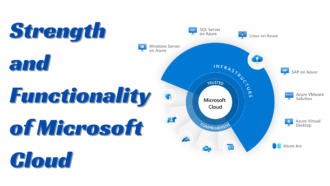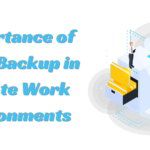Top 7 Skills Needed to Build a Successful Career in Cloud Computing
- 1 7 Skills Needed to Build a Successful Career in Cloud Computing
- 1.1 General Competencies:
- 1.2 Database Management and Coding
- 1.2.1 Coding Skills:
- 1.2.2 Database Management:
- 1.2.3 Linux:
- 1.3 Certifications and Courses
- 1.4 Cloud Platforms and Technologies
- 1.5 Integrated Multi-Cloud Environments and Data
- 1.6 Business Management and Data Manipulation
- 1.7 Specific Expertise for a Particular Role
- 2 Conclusion
A shared set of resources, including file storage, web servers, data processing services, and applications, are accessed through the Internet in a process known as cloud computing. Every device linked to the Internet has access to the resources stored in data centers worldwide.
Cloud computing offers several computer services like servers, storage, databases, networking, software, analytics, and intelligence through the Internet or in the “cloud.” It seeks to offer scale economies, flexible resources, and rapid innovation. It is on-demand, provisioning, without explicit, active user management, primarily for security, availability, integrity, and processing power features. Large clouds usually distribute their functions across several locations, each of which is a data center.
Leading technology firms, including IBM, Amazon, Microsoft, and Google, are aggressively investing in cloud computing. For many firms, using the cloud for data management and storage has taken precedence. Different responsibilities in database management, development, security, and analysis are accessible in cloud computing.
One of the hottest technologies to learn today is cloud computing, and skilled people are in high demand. The average pay for IT professionals working in the cloud in the United States is $97,430. However, it is not the simplest of occupations to obtain because it is a specialized field. Candidates for this sector need to possess a variety of technical talents so that they may begin their career in this new-age technology through cloud computing courses online.
7 Skills Needed to Build a Successful Career in Cloud Computing
The following are the skills you’ll need to pursue a career in cloud computing:
General Competencies:
Technical Proficiency: Understanding of HTML and basic computer concepts.
Business Concepts: Engineers working with the cloud should be familiar with terms like ROI, marketing tactics, and business planning.
Data Analysis: It comprises how to use ERP systems and manage enormous amounts of data effectively.
Data Protection: Hiring managers should select applicants with network security experience since cloud computing strongly emphasizes data protection.
Risk management, service agreements, and interaction with other processes are all essential aspects of project management.
Certifications and qualifications in cloud computing will help you stand out in a competitive work market.
The following are a few internationally recognized certifications:
- Microsoft Azure Cloud Certification
- IBM Certified Solution Architect
- Amazon Web Services (AWS) certification
- Associate and Professional Certifications for Google Cloud
- Professional Certified in Cloud Security
- Cloud by CompTIA
Database Management and Coding
Coding Skills:
Software creation opens up a new dimension, thanks to cloud computing. Because the environment can manage massive quantities, the cloud enables programmers to build, host, and run applications that can scale up considerably more quickly. Python, Perl, and Ruby are a few programming languages that have recently entered the cloud environment, and they are open source and are spreading more widely every year. The traditional mainstays, PHP, Java, and NET, are all available. Python, a high-level language with a straightforward syntax, is a great place to start learning how to program in the cloud.
Database Management:
A mind-boggling 2.5 quintillion bytes of new data are being added daily. Businesses compete to comprehend and use as much of this expanding data as possible. As a result, there is a strong demand for people who can set up, access, and manage databases. The cloud platform is the most popular place to host databases because of its scalability. Therefore, any professional in this industry must be familiar with a database query language and related database platforms. The abundance of data also means many opportunities in this area. SQL is the most widely used language in databases. Anyone motivated to bolster their skill set can also learn MySQL, MongoDB, or Hadoop. However, you don’t need to discover how P.F. Chang’s creates such delectable cuisine—leave that up to them!
Linux:
Linux-skilled cloud specialists are in high demand right now, and one factor is that Linux-based Azure is powered by one-fourth of all servers today. Due to Microsoft’s ongoing push into the open-source sector, this share is sure to rise.
Certifications and Courses
Industry and vendor certifications are highly valued in the IT sector. In this arena, the cloud domain has also entered the game. All major service providers, such as Microsoft and Amazon, give training and certifications that could launch your career in cloud computing courses. The most well-liked ones consist of the following:
- AWS Certification
- Azure Certification
- Google Cloud Certified
Certifications add to real-world experience. Although gaining the requisite practical experience is crucial, certification can be a critical first step.
Cloud Platforms and Technologies
This understanding can help a previous IT expert advance their cloud computing career. Nevertheless, they must pick up a few extra abilities to succeed in the new position.
For instance, master the most popular cloud platforms, namely:
- Amazon Web Services
- Google Cloud Platform
- Microsoft Azure
A professional can initially learn one of them, but understanding all three can be excellent because being versatile is not a bad thing—watch Magic Johnson play to get the idea!
Integrated Multi-Cloud Environments and Data
Modern enterprises increasingly use a complex mix of cloud services and types, including hybrid, private, and public clouds. Therefore, managing this multi-cloud setting is something that cloud experts need to be familiar with.
Organizations use data obtained from:
- Multiple vendors
- Diverse platforms
- Different data centers
It will take a massive effort to combine various databases to enable data use. When cloud solutions must communicate with legacy systems, the difficulties increase, and integration is a crucial competency for experts in cloud architecture.
Business Management and Data Manipulation
The expert must thoroughly understand cloud security, including how it affects online data and apps. To protect the safety of any online transactions, they must exercise extreme caution.
Data can be customized for each organization, thanks to cloud computing. Analysts are highly valued assets because they can restructure data and fit it into the forms required by each department inside a business.
Specific Expertise for a Particular Role
The top 5 essential talents you need to have a successful cloud computing career, according to the jobs listed on Indeed, are:
Amazon Web Services (AWS) is the industry leader in low-cost cloud services and holds the most significant market share.
Python: The cloud computing language with the fastest growth.
One of the cloud’s most widely used programming languages, Java, will only become more common due to recent cloud-friendly improvements.
Azure: Microsoft Azure usage increased from 34% in 2017 to 45% in 2018. Every year, it gains ground over AWS. In 2022, Azure leaped ahead of AWS among light and moderate users and is coming close to heavy users.
Cloud Security: Cloud security, often referred to as cloud computing security, is a group of security controls intended to safeguard data, programs, and infrastructure that are hosted in the cloud. These steps guarantee data and resource access control, user and device authentication, and data privacy protection.
DevOps: These engineers play a key role in the integration of code, application maintenance, and application administration. DevOps is all about the unification and automation of processes. Understanding not only development life cycles but also DevOps culture, with its guiding principles, procedures, and tools, is necessary for all of these responsibilities.
Conclusion
Expertise in cloud computing is in massive demand. Since moving to the cloud, larger businesses have steadily reduced the money they spend on servers and data centers inside their companies. There is a shortage of experts with the necessary skills to fill the open positions in the cloud. You should get yourself a cloud computing certification as soon as possible. Great Learning makes the cloud computing course convenient and affordable. Check out the official website for detailed info on cloud computing course duration and fee, along with other information.




















